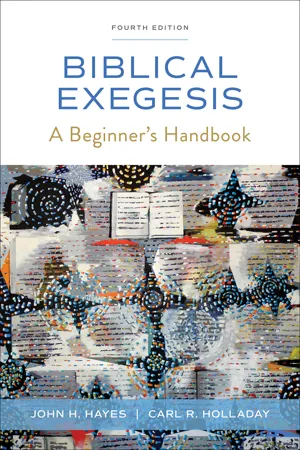
- 256 pages
- English
- ePUB (mobile friendly)
- Available on iOS & Android
About this book
This is a beginner's guide to biblical exegesis, providing exegetical methods, practices, and theories. This book provides simple, helpful information and guidance about doing exegesis, without being overly prescriptive; succinctly introduces students to various methods; provides basic bibliographies that take students beyond an introductory discussion; and emphasizes exegesis as an everyday activity based on commonsense principles rather than as an esoteric enterprise.
This revised edition of this perennially best-selling textbook includes discussions of emerging methods of interpretation aimed at a contemporary audience. Several chapters have been updated and improved, and readers will find an incisive new chapter on exegesis with a focus on identity and advocacy. Holladay has also written a new concluding chapter on exegesis as the art of seeing. Bibliographies are updated, and a helpful glossary is included in this new edition.
Frequently asked questions
- Essential is ideal for learners and professionals who enjoy exploring a wide range of subjects. Access the Essential Library with 800,000+ trusted titles and best-sellers across business, personal growth, and the humanities. Includes unlimited reading time and Standard Read Aloud voice.
- Complete: Perfect for advanced learners and researchers needing full, unrestricted access. Unlock 1.4M+ books across hundreds of subjects, including academic and specialized titles. The Complete Plan also includes advanced features like Premium Read Aloud and Research Assistant.
Please note we cannot support devices running on iOS 13 and Android 7 or earlier. Learn more about using the app.
Information
Table of contents
- Cover
- Endorsements
- Half Title
- Title Page
- Copyright
- Contents
- Preface to the Fourth Edition
- Preface to the Third Edition
- Abbreviations
- 1. Introducing Exegesis
- 2. Textual Criticism: The Quest for the Original Wording
- 3. Historical Criticism: The Setting in Time and Place
- 4. Grammatical Criticism: The Language of the Text
- 5. Literary Criticism: Rhetorical and Narrative Dimensions of the Text
- 6. Form Criticism: The Genre and Life Setting of the Text
- 7. Tradition Criticism: The Stages behind the Text
- 8. Redaction Criticism: The Final Viewpoint and Theology
- 9. Structuralism and Poststructuralism: Universals and Differences
- 10. Canonical Criticism: The Sacred Text of Synagogue and Church
- 11. Exegesis: Identity and Advocacy
- 12. Integrating Exegetical Procedures
- 13. Employing the Fruits of Biblical Exegesis
- 14. Exegesis: The Art of Seeing
- Appendix: Using Electronic Technologies in Exegesis
- Glossary
- Index of Scriptural References
- Index of Subjects and Names